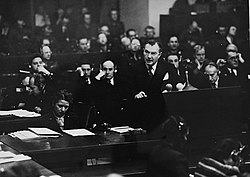Prosecutor

Chief Prosecutor Robert Jackson at the Nuremberg Trials
|
|
| Occupation | |
|---|---|
|
Occupation type
|
Profession |
|
Activity sectors
|
Law, Law Enforcement |
| Description | |
| Competencies | Advocacy skills, analytical mind, sense of justice |
|
Education required
|
Bar Vocational Course (England & Wales jurisdiction), Bar exam, possibly Common Professional Examination. |
|
Related jobs
|
Barrister, solicitor, advocate, judge, magistrate |
The prosecutor is the chief legal representative of the prosecution in countries with either the common law adversarial system, or the civil law inquisitorial system. The prosecution is the legal party responsible for presenting the case in a criminal trial against an individual accused of breaking the law.
Prosecutors are typically lawyers who possess a law degree, and are recognized as legal professionals by the court in which they intend to represent society (that is, they have been admitted to the bar).
They usually only become involved in a criminal case once a suspect has been identified and charges need to be filed. They are typically employed by an office of the government, with safeguards in place to ensure such an office can successfully pursue the prosecution of government officials. Often, multiple offices exist in a single country, especially those countries with federal governments where sovereignty has been bifurcated or devolved in some way.
Since prosecutors are backed by the power of the state, they are usually subject to special professional responsibility rules in addition to those binding all lawyers. For example, in the United States, Rule 3.8 of the ABA Model Rules of Professional Conduct requires prosecutors to "make timely disclosure to the defense of all evidence or information ... that tends to negate the guilt of the accused or mitigates the offense." Not all U.S. states adopt the model rules; however, U.S. Supreme Court cases and other appellate cases have ruled that such disclosure is required. Typical sources of ethical requirements imposed on prosecutors come from appellate court opinions, state or federal court rules, and state or federal statutes (codified laws).
In Australia, Canada, England and Wales, Hong Kong, Northern Ireland, Republic of Ireland, Trinidad & Tobago, Kenya, and South Africa, the head of the prosecuting authority is typically known as the Director of Public Prosecutions, and is appointed, not elected. A DPP may be subject to varying degrees of control by the Attorney General, usually by a formal written directive which must be published.
...
Wikipedia
